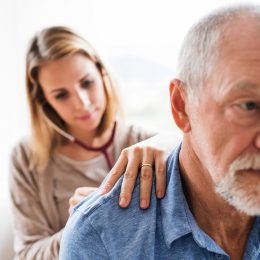3 Physical Signs of Depression You Might Not Know
Headaches? Heartburn? Your body might be telling you to pay attention to your mental health.

There’s no time like the present to prioritize your health. To help you, we’re presenting a special Take Charge of Your Health Care 7-Day Challenge. Don’t worry — you’re not being graded, and the topics are quick and easy to digest. Here’s Lesson Six.
While depression is often associated with sadness or feeling joyless and indifferent — and certainly those can be major signs that something is awry — they’re not the only symptoms worth watching. The mind-body connection is so strong that you may experience physical symptoms as well.
“It’s very common for people to experience physical issues that seem unrelated to their mental health, but in digging a little deeper, they turn out to be linked,” says Scott Kaiser, M.D., geriatrician and director of geriatric cognitive health for Pacific Neuroscience Institute at Providence Saint John’s Health Center in Santa Monica, California.
“We need to move beyond the idea that mental and physical health are separate, because they have a huge impact on each other,” he adds. Addressing one can have a big effect on the other. “But you have to take that first step of acknowledging that your body is trying to tell you something.”
Here are some of the top physical complaints docs tend to see that can have a mental health connection. Of course, these issues may be coming from other undiagnosed conditions, Dr. Kaiser notes, but if you’re experiencing them frequently and recommended treatments don’t seem to be resolving the symptoms, it may be worth getting screened for depression.
Physical Sign #1: Back Pain
The association between emotional difficulties and chronic lower-back pain is well-known among researchers. But the close tie hasn’t been relayed to the public. On their own, both pain and stress can throw off your sleep. Together, they make for an ugly cycle, says Ai Mukai, M.D., a physiatrist specializing in spine pain for Texas Orthopedics.
“Pain, mood, and sleep are all regulated by similar chemicals in the body,” she says. “When pain is present, it affects sleep and mood, and vice versa. It can become a cyclical problem if one of the three is off, particularly if there’s depression.”
The cycle is more common with chronic, long-term pain, she adds. So if you have a sudden back pain flare, it’s likely musculoskeletal, but if you have a nagging, persistent ache, depression may be involved. Dr. Mukai says chronic back pain can also cause depression, especially if it’s limiting your mobility and ability to function.
“A comprehensive treatment plan should be addressing your mood and coping mechanisms in addition to your actual pain,” she says.
Physical Sign #2: Headaches and Body Aches
Like back pain, struggling with pain in other parts of the body is also common with depression, and it tends to be more prevalent with older people who have depression, compared with those who are younger, says Edith Burns, M.D., a professor in the division of geriatrics and palliative medicine at the Feinstein Institutes for Medical Research in Manhasset, New York.
“A larger proportion of older adults are likely to have atypical or nonclassical presentation of many conditions, including depression,” she says. “In addition to a loss of pleasure in usual activities, they may find they have new or worsening physical symptoms.”
That includes a sudden onset of headaches, for example. Or you might experience pain that “moves around,” meaning it shows up as aching knees one day and a sore shoulder the next, for instance. A study published in the Journal of Pain Research that looked at 54 older people with chronic pain found that they experienced more frequent depression, lower resilience, and a lower quality of life, compared with a similarly aged group without chronic pain.
Physical Sign #3: Digestive Issues
Bloating, constipation, chronic heartburn, upset stomach, diarrhea, gas, cramping — when you have digestive problems, the trouble can feel endless. And it’s very possible that your emotional state can either cause it or make it worse, Dr. Kaiser says.
“The gut-brain connection is incredibly strong, and it’s bidirectional,” he says. “Problems with digestion can affect your mood and vice versa.”
That’s because serotonin, an extremely important neurotransmitter that gives you a feeling of well-being, is made primarily in the digestive system. Serotonin is so important to your mental health that many antidepressants work by optimizing how it operates in the body.
Subscribe to our newsletter
It's quick and easy. You could be one of the 13 million people who are eligible.
Already a member? Click to discover our 15,000+ participating locations.
Follow Us
When your digestive system isn’t working well, it can raise levels of two other hormones in the body, cortisol and adrenaline. Both are associated with stress. While they can be helpful in the short term — like when you need to react quickly to a car that cuts you off in traffic — chronically high levels can wreak havoc not just on your digestive system but also on your mental well-being.
For example, your blood sugar may spike, or you might toss and turn at night. Both of these effects can make pain worse and leave you with a crushing sense of ongoing fatigue.
Much like back pain, depression and its effects can build on each other, which means that as your digestive issues get worse, your emotional health could too.
What to Do if You Notice These Signs
If the signs above have you suspecting depression might be a problem for you, make an appointment to talk to your doctor, Dr. Kaiser says. They can help you determine what’s really going on and discuss treatment options. You might benefit from cognitive behavioral therapy (a form of talk therapy), antidepressants, or physical exercise and other lifestyle changes — or a combination of these.
“We often see that treating the emotional difficulties can reduce or even alleviate the physical challenges some people face,” Dr. Kaiser says, adding that lifestyle habits like healthy eating, consistent exercise, and socializing can help as well.
“Even if you don’t have depression, these types of positive changes can have a protective effect on your mental health,” he says.
Check Your SilverSneakers Eligibility Instantly
SilverSneakers members can go to thousands of gyms and fitness locations across the nation, plus take SilverSneakers LIVE online classes that are designed for seniors of all levels. If you have a Medicare plan, it may include SilverSneakers — at no additional cost. Check your eligibility instantly here.
Not eligible for SilverSneakers? You can still get 200+ free SilverSneakers On-Demand videos and stay in touch with us by creating your online account.





